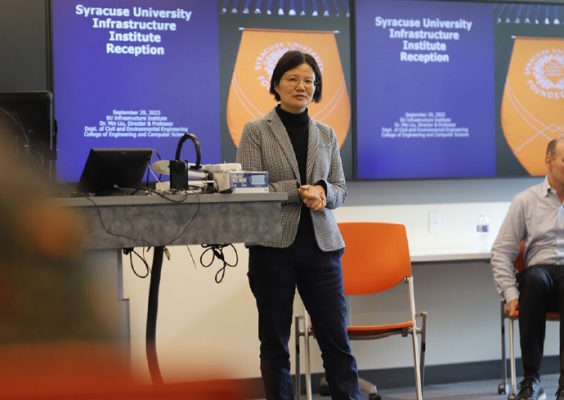As the construction industry faces challenges in infrastructure maintenance, Syracuse University has established the Infrastructure Institute to develop new approaches to address these issues. Under the leadership of Director Min Liu, the Abdallah H. Yabroudi Endowed Professor in Sustainable Civil Infrastructure, the institute strives to develop talent, conduct research, and educate the public to ensure a sustainable, collaborative future in infrastructure.
“The biggest issues we see right now are public safety, the environmental impact of infrastructure and a long-term shortage of skilled laborers,” says Liu. “My vision for this institute is to build a platform to facilitate different people from different sections to work together.”
Professor Min Liu speaks at a reception for the Infrastructure Institute
Liu earned her Ph.D. in engineering project management from the University of California, Berkeley in 2007. She then worked as an assistant and later associate professor at North Carolina State University until 2022. During her tenure, she conducted research on construction engineering and management, collected large amounts of empirical data and used modeling programming to analyze the data and improve productivity.
Additionally, Liu worked with the North Carolina Department of Transportation and the Construction Industry Institute. She was chair of the ASCE Construction Research Council from 2020-21. She joined Syracuse University in 2022, bringing years of experience to her respective roles.
The Infrastructure Institute is developing academic programs, research opportunities and internships for students and educational programs for public officials and professionals. The institute also collaborates with a wide range of professionals, including information technology experts, data analysts, architects, environmental design professionals, journalists and business professionals.
Liu’s goal is to create a platform that consists of three main pillars: the public, private, and student and faculty sectors. “Public authorities provide the direction and funding for infrastructure. Universities and faculty provide education to students. Students will then become the fresh blood for the public authorities and construction industry. These three sectors are crucial and it’s important they work together,” Liu says.
Liu has organized various events to integrate the different disciplines within the institute, including a reception attended by nine different departments and centers at the University. During the event, lightning talks were hosted, and attendees discussed their vision for the future and ongoing research. This event also provided an opportunity for people to socialize and get to know each other.
“With the support of the Office of Research and collaborating with the School of Architecture, the institute developed a request for proposal to encourage and facilitate collaboration across the SU campus to improve infrastructure policy and delivery based on the I-81 project,” says Liu.
Liu taught a capstone course that included various students across the college with the goal of helping them prepare for their roles in infrastructure project management and delivery.

